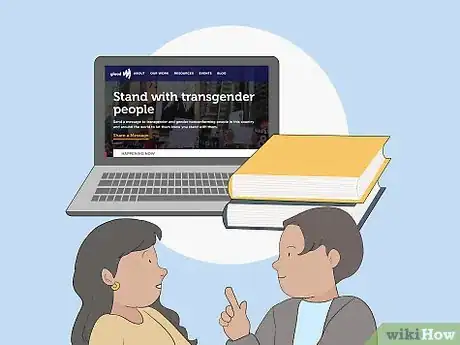This article was co-authored by Lily Zheng, MA and by wikiHow staff writer, Danielle Blinka, MA, MPA. Lily Zheng is a Diversity, Equity, and Inclusion Consultant and Executive Coach who works with organizations around the world to build more inclusive and innovative workplaces for all. Lily is the author of Gender Ambiguity in the Workplace: Transgender and Gender-Diverse Discrimination (2018) and The Ethical Sellout: Maintaining Your Integrity in the Age of Compromise (2019). Lily earned her MA in Sociology from Stanford University.
This article has been viewed 26,467 times.
You deserve to live as your authentic self, but coming out as transgender at work can be scary. Start by researching your company policies, learning about your rights, and practicing how you’ll answer questions. Then, come out to a person who will support you. After you talk to the person you trust, come out to management or human resources to get your employer’s support. Finally, tell your coworkers about your true gender identity.
Steps
Preparing to Come Out
-
1Research your company’s policies regarding transgender rights. Many employers have policies or procedures relating to transgender employees, so learn about your workplace rules. Read your employee handbook to see what it says about transgender employees. If you can, discuss the policies with a member of human resources (HR) to get more information.[1]
- If you ask HR, they may realize that you’re trans before you’re ready to come out.
- If you work for a big company, do an online search for news articles relating to your company and transgender or LGBTQ+ issues. This can help you get an idea about the company’s informal policies.
-
2Review your legal rights as a member of a possibly protected class. Your rights will vary depending on where you live. For instance, there’s no federal law protecting transgender employees in the United States, but some areas do have laws in place to protect you. Research the laws for your country, state or providence, and city to find out if you’re protected and how.[2]
- Keep a copy of the laws protecting your rights so you can show it to management if problems arise.
Advertisement -
3Listen to other people’s stories about coming out to gain advice. Everyone’s coming out experience is different, but you can learn from what others did. Find out what worked well for others and what didn’t. Then, use that information to help your coming out process go more easily. Here are some ways to get advice:[3]
- Talk to your friends who are transgender about their coming out experience.
- Read coming out stories online.
- Seek advice in online forums for transgender individuals.
-
4Practice how you’ll answer common questions about your trans identity. You don’t owe anyone an explanation about your identity, and what you share with others is completely your choice. However, it’s likely that people are going to ask you questions when you come out. Decide how you want to answer these questions in advance and practice delivering your response.[4]
- For instance, people might ask basic questions like, “Have you always known you were a woman?” “When did you realize you were trans?” or “Why are you coming out now?” You might decide to deliver a response like, “I realized I was really female at 5-years-old, but it’s been hard to feel accepted. I’m at a point in my life where I feel like I can finally be myself, so I’m being honest about who I really am.”
Tip: Don’t feel pressured to answer intrusive questions. If someone asks you something that makes you uncomfortable, decline to answer and change the subject. Say, “I’m not comfortable talking about that. What are you doing this weekend?”
-
5Prepare for possible repercussions but try to be optimistic. Although many workplaces have inclusive policies, this isn’t always the case, and you might experience discrimination. While it’s totally unfair, coming out could be a negative experience for you. Before you come out, create a plan for what you’ll do if things don’t go well. Here are some things to consider:[5]
- Save some money before you come out.
- Practice asserting your rights if you have protections.
- Get documentation about your job performance before you come out, if possible. For instance, get copies of your performance reviews or your sales documents. This way you can show you’re a valuable employee.
- Update your resume so you’re prepared to search for a new job.
-
6Talk to your counselor if you’re feeling worried. It’s normal to feel stressed when you’re getting ready to come out as trans. Discuss your feelings with your counselor and ask for their advice. Let them help you through this process so it’s as easy as possible.[6]
- You might say, “I’m ready to come out at work, but I’m worried about my career.”
Choosing an Ally
-
1Choose a person who you trust to be there for you. It’s best to start with a single employee who can be a support for you as you tell the rest of your coworkers. Pick a coworker who is close to you at work. They can be in any position, but they may be able to help you more if they’re well-respected in the workplace.[7]
- If your unsure who to choose, ask the people you’re closest to a few questions about their beliefs regarding LGBTQ+ rights. You might say something like, “Do you think our workplace has inclusive policies?” or “Do you think we should post rainbow stickers for pride next year?”
EXPERT TIPLily Zheng is a Diversity, Equity, and Inclusion Consultant and Executive Coach who works with organizations around the world to build more inclusive and innovative workplaces for all. Lily is the author of Gender Ambiguity in the Workplace: Transgender and Gender-Diverse Discrimination (2018) and The Ethical Sellout: Maintaining Your Integrity in the Age of Compromise (2019). Lily earned her MA in Sociology from Stanford University.Diversity, Equity & Inclusion Consultant
 Lily Zheng, MA
Lily Zheng, MA
Diversity, Equity & Inclusion ConsultantOur Expert Agrees: If you want to come out as transgender at work, find an ally in a manager or other workplace leader who can be a source of support. One way to identify a potential ally is to bring up topics of gender identity, gender expression, or transgender issues to learn about people's opinions.
-
2Practice what you want to say. Decide what you’re comfortable disclosing to your ally. Then, write out what you plan to say to help you process your thoughts. Recite your thoughts aloud to practice explaining them. Keep practicing until you feel comfortable.[8]
- You might say something like, “Since I was 7, I knew I was actually a male. I need to live my life as my authentic self, so I want to come out at work as a man. I consider you to be an open-minded, caring person, so I hoped you’d support me.”
- Ask a friend or family member to stand-in for the coworker you plan to tell. Then, practice telling them what you plan to say.
-
3Schedule a time to talk in private. Tell your coworker that you have something personal to discuss with them and ask when it would be a convenient time. Then, arrange a time and place to speak in private. Allow enough time for them to ask any relevant questions that they may have.[9]
- For instance, you might ask them out to lunch or could invite them to a post-work happy hour.
-
4Explain to them that you’re transgender. Tell your coworker what you planned to say. Be as brief or detailed as you like. Keep in mind that you’re in control of the conversation and don’t owe them any type of explanation.[10]
- Say something like, “I invited you to lunch today because I trust you. I feel comfortable telling you that I’m actually a transgender woman, and I’m now ready to fully live my life as my authentic self. I’m ready to come out at work, and you’re the first person I’m telling.”
-
5Ask them to support you as you come out at work. After you tell them you’re transgender, tell them that you chose them because you thought they’d be supportive. Then, directly ask them to be your ally. However, give them an out in case they don’t feel comfortable being a part of the process.[11]
- You might say, “I hope that you’ll be there to offer support as I come out to our coworkers, but I understand that you might not feel comfortable with this role.”
Telling Management
-
1Talk to your supervisor before telling the rest of the office. Telling your boss can be really scary, but it's important that they hear it from you. You don't want them finding out from a coworker or overhearing it through gossip. Sit down with your supervisor and explain that you’re transgender. Share only what you’re comfortable telling them.[12]
- Say, “Since I was a child, I knew I was a transgender man. Now, I’m ready to come out at the office.”
Variation: If you suspect your supervisor won’t be supportive, come out to their supervisor or the human resources manager first.
-
2Provide your supervisor or HR rep documentation about your transition. You may not need to provide any documentation. However, it’s best to offer them educational materials about transitioning and any personal documents you have related to your transition. Give them these papers during your disclosure so they understand that this is a big deal.[13]
- At a minimum, it’s helpful to give them educational material, like a printed hand out. Ask your counselor if they have any materials you could use or print some out from online resources.
- If you’ve changed your name, birth certificate, or drivers license, give them a copy of these items to show you’re legally transitioned, if this is the case for you.
Tip: Keep in mind that you don’t need to have legal documents to come out. It doesn’t matter what your drivers license or birth certificate says. You deserve to live as your authentic self, and people should respect that.
-
3Discuss what you need from your employer to support your coming out. Some workplaces might have policies in place to help management support you during your transition. However, it’s likely that you’ll need to tell them what supports you require. Be specific about the changes you expect now that you’re out as transgender.[14]
- You might say, “I need you to call me by my preferred name and my preferred pronouns. Additionally, I plan to use the bathroom for my true gender.”
Informing Your Coworkers
-
1Decide how you want to tell the rest of your coworkers. Telling the entire workplace can be a challenge, and you may have to come out more than once. Once you’ve discussed things with management, choose your preferred way of telling everyone else. Here are your options:[15]
- Talk to each person one at a time.
- Tell people in small groups.
- Send a letter to the entire office.
EXPERT TIPLily Zheng is a Diversity, Equity, and Inclusion Consultant and Executive Coach who works with organizations around the world to build more inclusive and innovative workplaces for all. Lily is the author of Gender Ambiguity in the Workplace: Transgender and Gender-Diverse Discrimination (2018) and The Ethical Sellout: Maintaining Your Integrity in the Age of Compromise (2019). Lily earned her MA in Sociology from Stanford University.Diversity, Equity & Inclusion Consultant
 Lily Zheng, MA
Lily Zheng, MA
Diversity, Equity & Inclusion ConsultantOur Expert Agrees: Choose to what extent you want to be a visible advocate and to what extent you want to keep things more private. For example, it may not be best to publicly come out to everyone in the workplace. Be strategic and flexible about what's best for you, including how much you disclose, in what way, and to which people.
-
2Write a letter to your coworkers if you want to tell everyone at once. A letter is a great option for coming out because it allows you to present your thoughts clearly. Additionally, each coworker will have time to process it before they talk to you again, which might prevent awkward moments. Write out what you want your coworkers to know, keeping it under a page. Then, get your boss’s okay to send it out.[16]
- This might be easier than coming out over and over again.
- The letter also ensures that everyone gets the same information at once.
-
3Tell your coworkers what will change now that you’re out. It’s likely that your coworkers won’t automatically know what you expect from them, so tell them how you want them to treat you. Explain this information in your letter or tell each group one-on-one. Include the following information:[17]
- What name they should call you.
- Which pronouns they should use.
- Which bathrooms you will use.
-
4Offer your coworkers educational materials to help them understand. Some of your coworkers might not understand what it means to be transgender. They may also have outdated ideas about it. To help them better understand, offer them printed materials or links to websites where they can learn accurate, researched information.[18]
- For instance, you might send them to the GLAAD website.[19]
Warnings
- You deserve respect, so don’t tolerate someone being rude or verbally abusive toward you. Report inappropriate behavior as soon as it happens.⧼thumbs_response⧽
- Get help if you are worried that someone may turn violent or abusive towards you.⧼thumbs_response⧽
References
- ↑ https://hbr.org/2018/10/7-myths-about-coming-out-at-work
- ↑ http://www.gendersanity.com/plan.html
- ↑ https://hbr.org/2018/10/7-myths-about-coming-out-at-work
- ↑ http://www.gendersanity.com/plan.html
- ↑ http://www.gendersanity.com/plan.html
- ↑ http://www.gendersanity.com/plan.html
- ↑ https://hbr.org/2018/10/7-myths-about-coming-out-at-work
- ↑ https://www.thehrdigest.com/coming-out-as-transgender-at-work-im-a-bucket-of-nerves/
- ↑ https://hbr.org/2018/10/7-myths-about-coming-out-at-work
- ↑ http://www.gendersanity.com/plan.html
- ↑ http://www.gendersanity.com/plan.html
- ↑ https://hbr.org/2018/10/7-myths-about-coming-out-at-work
- ↑ http://www.gendersanity.com/plan.html
- ↑ http://www.gendersanity.com/plan.html
- ↑ https://hbr.org/2018/10/7-myths-about-coming-out-at-work
- ↑ http://www.gendersanity.com/plan.html
- ↑ https://www.thehrdigest.com/coming-out-as-transgender-at-work-im-a-bucket-of-nerves/
- ↑ https://hbr.org/2018/10/7-myths-about-coming-out-at-work
- ↑ https://www.glaad.org/transgender/transfaq
- ↑ https://hbr.org/2018/10/7-myths-about-coming-out-at-work































-Step-14-Version-2.webp)












































